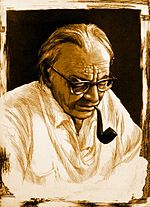- Die Kluge
-
Operas by Carl Orff 
Der Mond (1939)
Die Kluge (1943)
Antigonae (1949)
De Temporum Fine Comoedia (1973)Die Kluge. Die Geschichte von dem König und der klugen Frau (The Wise [Girl]. The Story of the King and the Wise Woman) is an opera in 12 scenes written by Carl Orff. It premiered in Frankfurt, Germany, on 20 February 1943. Orff referred to this opera as a Märchenoper (fairy tale opera). The composer also wrote the libretto, based on Die Kluge Bauerntochter (The Peasant's Wise Daughter) from the Grimm's Fairy Tales. A performance lasts for about 90 minutes and is often paired with Orff's Der Mond.
Contents
Roles and role creators
Role Voice type Premiere cast, 20 February 1943
Conductor: Otto WinklerThe king baritone Rudolf Gonszar The peasant bass Emil Staudenmeyer The peasant's wise daughter soprano Coba Wackers Prison governor bass Emil Staudenmeyer Donkey owner tenor Oskar Wittazscheck Mule owner baritone Günther Ambrosius First vagabond tenor Emil Seidenspinner Second vagabond baritone Paul Kötter Third vagabond bass Herbert Hesse Synopsis
The plot of the opera is that a poor peasant finds on his land a mortar made out of gold. He decides to take it to the king, thinking that he will be rewarded for being a loyal subject. His wise daughter tells him not to, because the king will throw him in the dungeons thinking that he has stolen the pestle, which in truth he didn't find.
The daughter's prediction comes true, and this is the beginning of the opera. When the king learns that the daughter had wisely known what his actions would be he sends for her to come before him. He tells her she has "talked a noose around her neck" and will give her two choices for how to save her life. She can either gamble for it, or answer 3 riddles.
The wise daughter chooses to answer the 3 riddles, and saves her life. The king makes her his queen and all seems happy.
The opera is only half over though. Three scoundrels have stirred up some trouble between the owners of a donkey and of a mule. One morning they found a baby donkey between the two beasts, and the mule owner ridiculously thought it could be his. The king agrees that since the baby was closer to the mule it must belong to it. The queen overhears this and sets up the donkey owner to show the king the error of his foolish judgment. The king realizes that his new wife is mocking him and working against his decision and he sends her away with a large box and tells her to take whatever she wishes and leave. The queen drugs her husband with opiates in his wine, and the opera happily ends with him waking up inside the box, and acknowledging that she truly is a wise woman. She contradicts him and says that no one who loves can be truly wise. Also at the end, the peasant finds the golden pestle which got him sent to the dungeons in the first place.
Orchestra
"Die Kluge" is scored for the following orchestra:
- Woodwind: 3 flutes (all 3 doubling piccolos), 3 oboes (3rd doubling English horn), 3 clarinets in B-flat, A, C and E-flat (1 doubling bass clarinet), 2 bassoons, contrabassoon
- Brass: 4 horns in F, 3 trumpets, 3 trombones, tuba
- Percussion (4 players): timpani, bass drum, 2 snare drums, tenor drum, tambourine, triangle, lithophone, sand rattle, antique cymbals, various Turkish cymbals, tamtam, ratchet, sleigh bells, castanets, tubular bells, glockenspiel
- Other instruments: harp, celesta, piano, strings
- Stage band: 3 trumpets, various drums, glockenspiel, organ
Noted arias
- "Oh hätt’ ich meiner Tochter nur geglaubt", the peasant
- "Schuh-schuhu, es fallen dem König die Augen zu", the wise girl
References
- Amadeus Almanac, accessed 13 August 2008
- Erik Levi. "Kluge, Die." In The New Grove Dictionary of Opera, edited by Stanley Sadie. Grove Music Online. Oxford Music Online (subscription required)
- Die Kluge at Schott Music
External links
Categories:- Operas
- German-language operas
- 1943 operas
- Operas by Carl Orff
Wikimedia Foundation. 2010.
